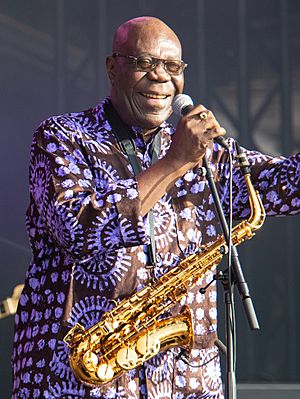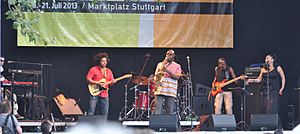Manu Dibango facts for kids
Quick facts for kids
Manu Dibango
|
|
|---|---|

Dibango in 2019
|
|
| Background information | |
| Birth name | Emmanuel N'Djoké Dibango |
| Born | 12 December 1933 Douala, French Cameroon |
| Died | 24 March 2020 (aged 86) Melun, France |
| Genres | Makossa, African rumba, afrofunk, afrobeat, jazz, traditional |
| Occupation(s) | Musician, songwriter |
| Instruments | Saxophone and vibraphone |
| Years active | 1961–2020 |
Emmanuel N'Djoké "Manu" Dibango (born December 12, 1933 – died March 24, 2020) was a famous musician and songwriter from Cameroon. He was known for playing the saxophone and vibraphone. Manu Dibango created a unique music style. It mixed jazz, funk, and traditional Cameroonian music. He became very famous for his 1972 song "Soul Makossa". Sadly, he passed away from COVID-19 in 2020.
Contents
Early Life and Education
Emmanuel "Manu" Dibango was born in Douala, Cameroon, in 1933. His father, Michel Manfred N'Djoké Dibango, worked for the government. His mother was a fashion designer who ran her own business. Manu's parents came from different ethnic groups, which was not common at the time.
As a child, Manu attended a Protestant church every night. There, he learned about religion and music. He was a quick learner and loved studying music.
In 1941, Manu went to a colonial school near his home. He learned French there and admired his teacher, who was a great artist. In 1944, the French president, Charles de Gaulle, visited Cameroon. Manu's school was chosen to perform a welcoming ceremony for him.
When he was 15, in 1949, Manu Dibango was sent to college in Saint-Calais, France. Later, he studied at the lycée de Chartres, where he learned to play the piano.
Music Career and Achievements
Manu Dibango was part of the important Congolese rumba group African Jazz. He also worked with many other famous musicians. Some of these included Fela Kuti, Herbie Hancock, and Ladysmith Black Mambazo.
His song "Big Blow" became a popular disco hit in the UK in the late 1970s. In 1998, he recorded an album called CubAfrica with Cuban artist Eliades Ochoa.
The Hit Song "Soul Makossa"
Manu Dibango's most famous song is "Soul Makossa" from 1972. The word "makossa" means "(I) dance" in the Cameroonian language Duala. This song was so influential that it inspired other popular hits. For example, Kool and the Gang's song "Jungle Boogie" was influenced by it.
In 1974, "Soul Makossa" was nominated for two Grammy Awards. These were for Best R&B Instrumental Performance and Best Instrumental Composition.
Music Rights and Recognition
Manu Dibango was the first chairman of the Cameroon Music Corporation. This group helped musicians get fair royalties for their work. In 2004, he was named a UNESCO Artist for Peace. This honor recognized his efforts to promote peace through music.
His song "Reggae Makossa" was featured in the 2006 video game Scarface: The World Is Yours. Another song, "New Bell," was in the 2008 video game Grand Theft Auto IV.
"Soul Makossa" and Sampling Disputes
In 1982, Michael Jackson used a famous part of Dibango's "Soul Makossa" in his song "Wanna Be Startin' Somethin'" from the album Thriller. Jackson used the "Ma ma-se, ma ma-sa, ma ma-kossa" part without asking Dibango for permission. When Dibango found out, he considered suing. However, Jackson quickly admitted he had borrowed the line, and they settled the issue privately.
In 2007, Rihanna used the same part from Jackson's song for her track "Don't Stop the Music". She did not credit Dibango either. Rihanna had asked Jackson for permission, and he approved without contacting Dibango first.
In 2009, Dibango sued both singers. A judge in Paris ruled that Dibango's claim was not valid. This was because he had previously settled a similar case, giving up his right to seek more money.
Later Years and Legacy
In July 2014, Manu Dibango performed an 80th birthday concert in Paris. It was broadcast on TV. In 2015, he was honored as a "Grand Witness of the Francophonie" for the 2016 Rio Olympic and Paralympic Games.
Manu Dibango passed away on March 24, 2020, from COVID-19 in France. He left behind a rich musical legacy that blended African rhythms with jazz and funk, influencing many artists worldwide.
Discography
As leader
- Saxy-Party (Mercury, 1969)
- Manu Dibango (Fiesta, 1971)
- Africadelic (Mondiophone, 1972)
- Soul Makossa (Fiesta, 1972)
- O Boso (Fiesta, 1972)
- African Woodoo (PSI, 1972)
- Makossa Man (Fiesta, 1973)
- Super Kumba (Fiesta, 1974)
- Countdown at Kusini (D.S.T., 1975)
- Afrovision (Fiesta, 1976)
- Manu 76 (Fiesta, 1976)
- Bande Originale du Film Ceddo (Fiesta, 1977)
- A L'Olympia (Fiesta, 1977)
- L'Herbe Sauvage (Fiesta 1977)
- Anniversaire Au Pays (Fiesta, 1978)
- Le Prix De La Liberte (Fiesta, 1978)
- Home Made (Fiesta, 1979)
- Gone Clear (CRC, 1980)
- Piano Solo Melodies Africaines Vol. 1 (AfroVision, 1981)
- Ambassador (CRC, 1981)
- Waka Juju (CRC, 1982)
- Mboa (AfroVision, 1982)
- Soft and Sweet (Garima, 1983)
- Deliverance Live in Douala (AfroVision, 1983)
- Surtension (Garima, 1984)
- Melodies Africaines Vol. 2 (AfroVision, 1984)
- L'Aventure Ambigue (Carrere, 1984)
- Electric Africa (Celluloid, 1985)
- Manu Invite... Akofa Akoussah Au Togo (Blackspot, 1983)
- Afrijazzy (Soul Paris, 1986)
- La Fete a Manu (Buda Musique, 1988)
- Negropolitaines Vol. 1 (Soul Paris, 1989)
- Comment Faire L'Amour Avec Un Negre Sans Se Fatiguer (Milan, 1989)
- Polysonik (Fnac Music, 1990)
- Live '91 (Fnac Music, 1991)
- Bao Bao (Mau Mau, 1992)
- Wakafrika (Fnac Music, 1994)
- Lamastabastani (Soul Paris, 1995)
- Negropolitaines Vol. 2 (Soul Paris, 1995)
- Papa Groove Live 96 (Wotre Music, 1996)
- CubAfrica (Melodie, 1998)
- Manu Safari (Wagram, 1998)
- Mboa' Su Kamer Feeling (JPS, 2000)
- Spirituals (Bayard Musique, 2000)
- Kamer Feeling (JPS, 2001)
- From Africa (Blue Moon, 2003)
- Homage to New Orleans (Goya, 2007)
- Lion of Africa (Global Mix, 2007)
- Past Present Future (BorderBlaster, 2011)
- Ballad Emotion (Konga Music, 2011)
- Balade en Saxo (EGT, 2014)
Compilations
- African Soul - The Very Best Of Manu Dibango (1997)
- Anthology (2000)
- Africadelic - The Best Of Manu Dibango (2003)
- The Rough Guide To Manu Dibango (2004)
See also
 In Spanish: Manu Dibango para niños
In Spanish: Manu Dibango para niños
 | Aurelia Browder |
 | Nannie Helen Burroughs |
 | Michelle Alexander |


